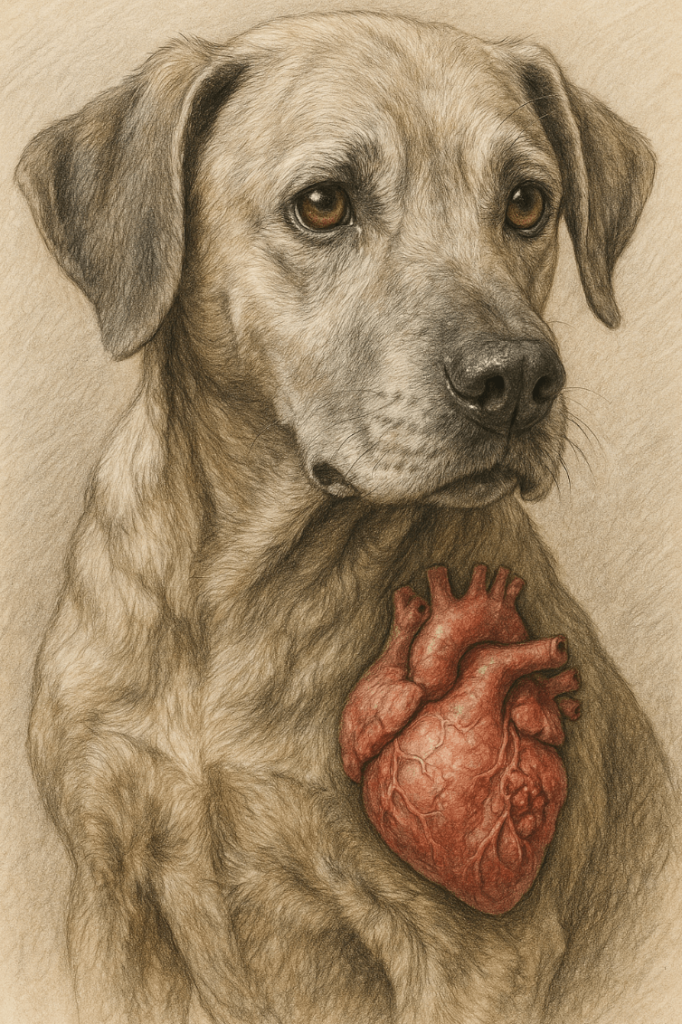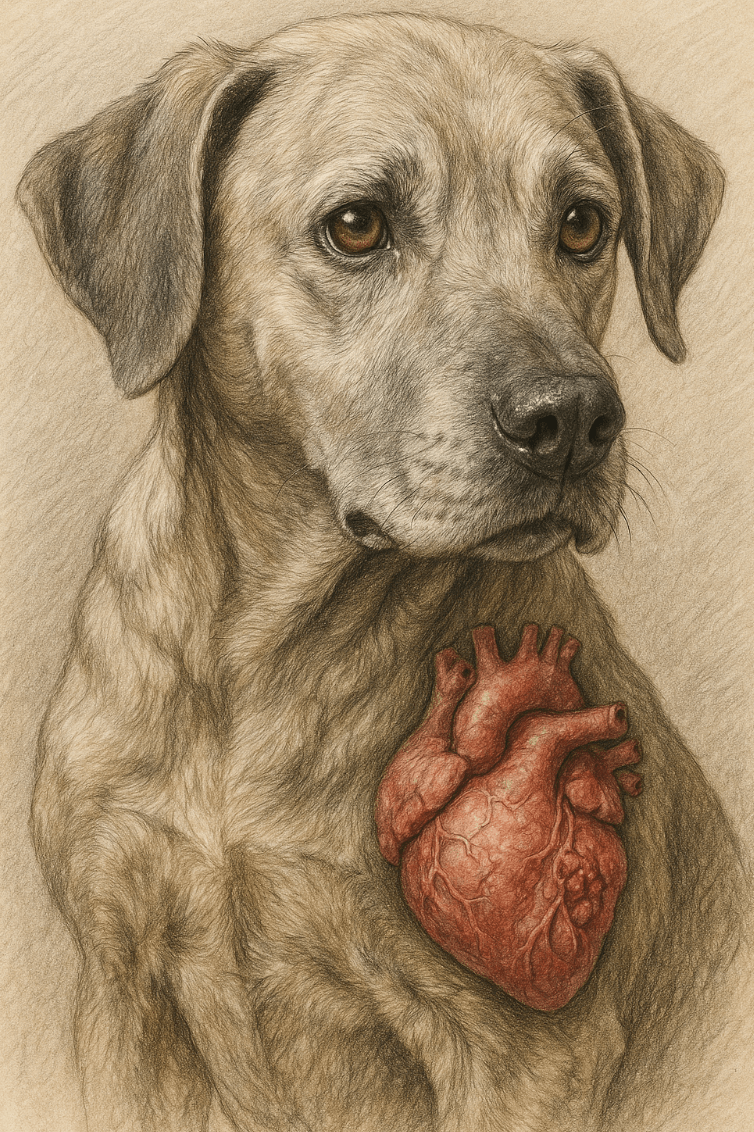Heart Cancer in Dogs: Understanding the Condition and Its Impact
Heart cancer in dogs is a rare but serious condition that can significantly affect your pet’s quality of life. While cancer in general is a growing concern for dog owners, tumors affecting the heart are particularly challenging due to their location and potential impact on vital functions. Heart cancer can manifest in different forms, such as hemangiosarcoma or other malignant growths, and early detection is crucial for managing the disease effectively. In this article, we’ll explore what heart cancer in dogs entails, its symptoms, treatment options, and steps you can take to support your furry companion through this difficult journey.
Expert Opinion
As Dr. Brittany Kleszynski, DVM, explains:
“Nobody likes to hear the word cancer, and unfortunately this disease is common in dogs, especially those of senior age. The signs of cancer in dogs can be subtle and easy to overlook, but pet parents can use this guide to learn what to look for. Early detection and treatment of cancer in dogs is critical. By detecting cancer early, you and your veterinarian can determine a suitable treatment approach to increase the chance for cure or remission.”
Common Symptoms of Heart Cancer in Dogs
Recognizing the signs of heart cancer early can make a significant difference in your dog’s prognosis. These symptoms often overlap with other heart-related conditions, so it’s important to consult your veterinarian for an accurate diagnosis.
Lethargy and Weakness:
Dogs with heart cancer may appear unusually tired or reluctant to engage in physical activities they once enjoyed.Difficulty Breathing:
Labored breathing, panting, or coughing can indicate that the heart is struggling to function properly due to the presence of a tumor.Abdominal Swelling:
Fluid accumulation in the abdomen, known as ascites, may occur if the cancer affects blood flow or causes heart failure.Loss of Appetite:
A sudden disinterest in food or weight loss can signal underlying health issues, including heart cancer.Fainting or Collapse:
Episodes of fainting or collapsing may result from reduced blood flow caused by the tumor pressing on the heart.
If you notice any of these symptoms, seek veterinary care promptly to determine the cause and explore treatment options.

Types of Heart Cancer in Dogs
Heart cancer in dogs can take various forms, each with its own characteristics and implications. Understanding these types helps veterinarians tailor treatment plans to the specific needs of affected dogs.
Hemangiosarcoma:
This aggressive cancer originates in the blood vessels and often spreads to the heart, making it one of the most common types of heart cancer in dogs.Atrial Myxoma:
A benign tumor that develops in the atrium of the heart, atrial myxoma can still disrupt normal heart function if left untreated.Rhabdomyosarcoma:
This rare form of cancer affects the heart muscle itself and tends to grow rapidly, posing significant challenges for treatment.Mesothelioma:
Although more commonly associated with the lungs, mesothelioma can also affect the lining around the heart, leading to fluid buildup and impaired function.Metastatic Tumors:
Cancers originating in other parts of the body, such as the spleen or liver, can spread to the heart, complicating diagnosis and treatment.
Each type of heart cancer requires careful evaluation to determine the best course of action for your dog’s health and well-being.
Check this guide 👉Dog Cancer Vaccine: Best 7 Expert Tips!
Check this guide 👉Dog Cancer Diet: Best 7 Expert Tips!
Check this guide 👉How to Test for Cancer in Dogs: Best 7 Expert Tips!
Symptoms to Watch For | Potential Causes of Heart Cancer |
|---|---|
Lethargy and weakness | Genetic predisposition |
Difficulty breathing | Exposure to environmental toxins |
Abdominal swelling | Age-related degeneration |
Loss of appetite | Previous history of cancer |
Fainting or collapse | Hormonal imbalances |
Treatment Options for Heart Cancer in Dogs
While heart cancer in dogs is often difficult to treat, several options are available to manage the condition and improve your dog’s quality of life. The choice of treatment depends on the type of cancer, its stage, and your dog’s overall health.
Surgery:
If the tumor is localized and accessible, surgical removal may be an option to alleviate pressure on the heart.Chemotherapy:
Chemotherapy drugs can help slow the progression of malignant cancers like hemangiosarcoma, though they may not cure the disease entirely.Radiation Therapy:
Targeted radiation can shrink tumors and reduce symptoms, especially when surgery isn’t feasible.Medications:
Drugs such as diuretics, anti-inflammatory medications, or pain relievers may be prescribed to manage symptoms and improve comfort.Palliative Care:
When curative treatments aren’t possible, palliative care focuses on maintaining your dog’s quality of life through supportive measures.
Discussing these options with your veterinarian ensures you choose the best path forward for your beloved pet.
How to Support Your Dog During Treatment
Caring for a dog with heart cancer involves more than medical interventions—it also requires emotional and physical support to help them cope with the challenges of the disease.
Provide a Comfortable Environment:
Create a calm, stress-free space where your dog can rest and recover without disturbances.Monitor Their Diet:
Offer nutritious meals tailored to their needs, ensuring they receive adequate energy and hydration.Engage in Gentle Exercise:
Light walks or playtime can keep your dog active without overexerting their weakened heart.Administer Medications as Directed:
Follow your vet’s instructions carefully to ensure your dog receives the full benefits of prescribed treatments.Spend Quality Time Together:
Strengthen your bond by spending extra time cuddling, grooming, or simply being present with your dog.
By providing holistic care, you can enhance your dog’s well-being and make their journey as comfortable as possible.
Risk Factors for Heart Cancer in Dogs
Understanding the risk factors for heart cancer can help dog owners take preventive measures and recognize potential warning signs. While not all cases can be prevented, awareness plays a key role in early intervention.
Age:
Older dogs are more susceptible to heart cancer due to the natural aging process weakening their immune system.Breed Predisposition:
Certain breeds, such as Boxers and Golden Retrievers, have a genetic predisposition to specific types of heart tumors.Environmental Toxins:
Exposure to chemicals, pesticides, or secondhand smoke may increase the risk of developing cancerous growths.Previous Health Issues:
Dogs with a history of heart disease or other cancers are at higher risk of developing secondary tumors.Poor Diet and Lifestyle:
Lack of exercise and poor nutrition can weaken a dog’s overall health, making them more vulnerable to diseases like cancer.
Being mindful of these factors allows you to make informed decisions about your dog’s care and minimize risks where possible.
Coping Strategies for Owners
Dealing with a dog’s heart cancer diagnosis can be emotionally overwhelming for pet parents. Finding ways to cope ensures you remain strong and supportive throughout your dog’s journey.
Educate Yourself:
Learning about the condition empowers you to ask the right questions and advocate for your dog’s care.Seek Emotional Support:
Connect with friends, family, or online communities who understand what you’re going through.Practice Self-Care:
Taking care of yourself physically and mentally enables you to be fully present for your dog.Set Realistic Expectations:
Accept that there may be ups and downs, and focus on celebrating small victories along the way.Prepare for End-of-Life Decisions:
Discuss euthanasia and hospice care options with your vet to ensure your dog’s final days are peaceful and dignified.
By prioritizing your emotional well-being, you can navigate this difficult time with grace and resilience.
Preventive Measures for Heart Health
While heart cancer cannot always be prevented, promoting your dog’s overall heart health reduces the likelihood of complications and improves their longevity.
Regular Veterinary Check-Ups:
Routine exams allow vets to detect abnormalities early before they escalate into serious conditions.Balanced Nutrition:
Feed your dog high-quality food rich in essential nutrients to support cardiovascular health.Maintain a Healthy Weight:
Obesity puts extra strain on the heart, so keeping your dog at an ideal weight is critical.Exercise Regularly:
Daily walks and playtime strengthen the heart muscle and promote circulation.Minimize Stress:
Chronic stress weakens the immune system; creating a peaceful environment helps protect your dog’s overall health.
Proactive measures like these lay the foundation for a healthier, happier life for your canine companion.
Frequently Asked Questions About Heart Cancer in Dogs
What causes heart cancer in dogs?
The exact cause is unknown, but genetics, age, and environmental factors may contribute to its development.
Is heart cancer in dogs curable?
Unfortunately, most cases are not curable, but treatments can extend life and improve comfort.
How long can a dog live with heart cancer?
Prognosis varies depending on the type of cancer and treatment; some dogs live months, while others may survive longer with proper care.
Can heart cancer be detected early?
Regular veterinary check-ups and monitoring for symptoms can aid in early detection, though many cases are diagnosed late.
Are certain breeds more prone to heart cancer?
Larger breeds like Golden Retrievers and Boxers have a higher risk of developing certain types of heart tumors.
Providing Love and Care for Dogs with Heart Cancer
Heart cancer in dogs is undoubtedly a heartbreaking diagnosis, but with knowledge, compassion, and proactive care, you can give your furry friend the best possible quality of life. By staying vigilant for symptoms, exploring treatment options, and offering unwavering support, you honor the bond you share with your dog during their time of need. Remember, every moment together is precious—celebrate the joy they bring and cherish the memories you create along the way.
Do Cats Have Taste Buds? Best 7 Expert Tips! – Discover how cats experience flavors and why their taste is so unique.
Do Dogs Have Taste Buds? Best 7 Expert Tips! – Discover how dogs experience taste, their preferences, and what it means for their diet and health.
Can Cats Taste Sweet? Best 7 Expert Tips! – Discover why cats can’t taste sweetness, how it affects their diet, and tips to keep them healthy and happy.
Can Dogs Taste Sweet? Best 7 Expert Tips! – Discover how dogs perceive sweetness, which foods are safe, and tips to manage their sweet cravings responsibly.





